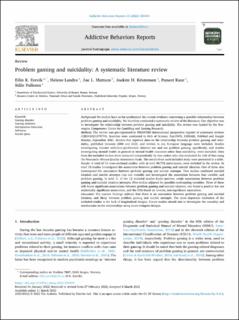| dc.contributor.author | Erevik, Eilin K. | |
| dc.contributor.author | Landrø, Helene | |
| dc.contributor.author | Mattson, Åse Lundegaard | |
| dc.contributor.author | Kristensen, Joakim Hellumbråten | |
| dc.contributor.author | Kaur, Puneet | |
| dc.contributor.author | Pallesen, Ståle | |
| dc.date.accessioned | 2022-06-07T11:10:20Z | |
| dc.date.available | 2022-06-07T11:10:20Z | |
| dc.date.created | 2022-03-10T06:54:41Z | |
| dc.date.issued | 2022 | |
| dc.identifier.issn | 2352-8532 | |
| dc.identifier.uri | https://hdl.handle.net/11250/2997685 | |
| dc.description.abstract | Background
No studies have so far synthesised the current evidence concerning a possible relationship between problem gaming and suicidality. We therefore conducted a systematic review of the literature. Our objective was to investigate the relationship between problem gaming and suicidality. The review was funded by the Norwegian Competence Center for Gambling and Gaming Research.
Methods
The review was pre-registered in PROSPERO International prospective register of systematic reviews (CRD42021279774). Searches were conducted in Web of Science, PsycINFO, EMBASE, PubMed and Google Scholar, September 2021. Studies that reported data on the relationship between problem gaming and suicidality, published between 2000 and 2021, and written in any European language were included. Studies investigating internet addiction/problematic internet use and not problem gaming, specifically, and studies investigating mental health in general or mental health outcomes other than suicidality, were excluded. Data from the included studies were extracted independently by two coders who also evaluated for risk of bias using the Newcastle-Ottawa Quality Assessment Scale. The results from each included study were presented in a table.
Results
A total of 12 cross-sectional studies, with in total 88,732 participants, were included in the review. In total 10 studies investigated the association between problem gaming and suicidal ideation. One of these also investigated the association between problem gaming and suicide attempts. Two studies combined suicidal ideation and suicide attempts into one variable and investigated the association between that variable and problem gaming. In total 11 of the 12 included studies found positive, crude associations between problem gaming and suicidal ideation/attempts. Five studies adjusted for possible confounding variables. Three of these still found significant associations between problem gaming and suicidal ideation, one found a positive but not statistically significant association, and the fifth found an inverse, non-significant association.
Discussion
The current findings indicate that there is an association between problem gaming and suicidal ideation, and likely between problem gaming and suicide attempts. The most important limitation of the included studies is the lack of longitudinal designs. Future studies should aim to investigate the causality and mechanisms in the relationships using more stringent designs. | en_US |
| dc.language.iso | eng | en_US |
| dc.publisher | Elsevier | en_US |
| dc.rights | Navngivelse 4.0 Internasjonal | * |
| dc.rights.uri | http://creativecommons.org/licenses/by/4.0/deed.no | * |
| dc.title | Problem gaming and suicidality: A systematic literature review | en_US |
| dc.title.alternative | Problem gaming and suicidality: A systematic literature review | en_US |
| dc.type | Journal article | en_US |
| dc.type | Peer reviewed | en_US |
| dc.description.version | publishedVersion | en_US |
| dc.rights.holder | Copyright 2022 The Authors | en_US |
| dc.source.articlenumber | 100419 | en_US |
| cristin.ispublished | true | |
| cristin.fulltext | original | |
| cristin.qualitycode | 1 | |
| dc.identifier.doi | 10.1016/j.abrep.2022.100419 | |
| dc.identifier.cristin | 2008668 | |
| dc.source.journal | Addictive Behaviors Reports | en_US |
| dc.identifier.citation | Addictive Behaviors Reports. 2022, 15, 100419. | en_US |
| dc.source.volume | 15 | en_US |

